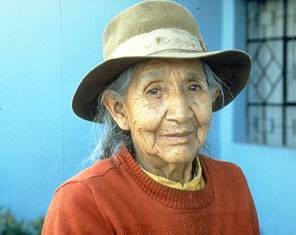|
|
Pension Reforms Hit Women Hard
Gustavo González, International Press Service
Latin America
December 20, 2004

Montaño and Flavia Marco, another specialist from the Economic Commission for Latin America and the Caribbean (ECLAC), coordinated studies in six countries of the region that confirmed the negative impact on women of one of the principal forms of "modernization" promoted by the free-market, "neoliberal" economic model.
Initial research conducted in Bolivia, Colombia and El Salvador was followed by discussion and analysis of the situation in Argentina, Brazil and Chile. The end result was a newly released book, Pension Systems in Latin America: A Gender Analysis, published by ECLAC, a Santiago-based U.N. regional agency.
The new book - in which five of the seven chapters were written by women - represents the most current and complete study of gender discrimination in retirement pension systems.
According to Montaño, this is an issue that has been largely ignored by feminists in the region. "In the book, I urge the feminist movement not to overlook such a strategic subject, and to reflect on the reasons why it isn't given the same priority as issues like domestic violence, reproductive health and poverty," she told IPS.
Pension reform in Latin America began in 1981 in Chile, and spread throughout the region in the 1990s. Its aim was to reduce budget deficits, one of the pillars of the so-called Washington Consensus of 1989, a series of neoliberal policies imposed on the region by the Washington-based international financial institutions. Other neoliberal dictates included trade liberalization and inflation control.
The former state-run, tax-funded pension system, in which contributions were made by workers, employers and the state, has been replaced with a system of individual retirement savings plans. Every month, workers pay a fixed amount into a savings account with a private institution, which administers the funds until the holders reach retirement age.
Chile's move was followed by Peru in 1993, Argentina and Colombia in 1994, Uruguay in 1996, Bolivia and Mexico in 1997, and El Salvador in 1998.
In Costa Rica, the reform was carried out gradually between 1998 and 2000. In the Dominican Republic, the reform process was begun in 2003 and is to be completed in 2006, while in Nicaragua, the individual retirement account system was adopted this year.
Ecuador, on the other hand, attempted to initiate pension reform this year, but was blocked by massive popular demonstrations, in which retirees played a leading role. In Brazil, a "mixed" system was approved in 2003, incorporating elements of both public and individual funding.
"The main goal of the pension reform was to reduce the budget deficit, but this hasn't happened, even though the public-funded solidarity-based system was dismantled because of its supposed financial unsustainability," said Montaño.
Pension reform is viewed as a purely economic issue, aimed at balancing budgets, without taking into account the political and social consequences and the need to guarantee people a decent living once their working lives are over.
Marco explained that the new privatized system works against women, because they face higher levels of unemployment, earn lower salaries, and are often employed in the informal sector, for example, as domestic workers.
Since women consequently earn less than men, their pension fund contributions are also lower, as are their pension payouts once they retire.
Another form of discrimination derives from the fact that pension payments are determined in accordance with life expectancy at the time of retirement. Because women tend to live longer, their monthly payouts are calculated over a longer period, resulting in a lower monthly income.
The ECLAC studies also noted that over 50 percent of women in these countries will not receive pensions, because they have spent their lives as homemakers, without paid employment. They will only be eligible for widow's benefits.
"In this way, women subsidize a system that excludes them, contributing their unpaid labor to caring for the family while their husbands work outside the home," Marco noted.
The situation is particularly difficult for women who live in rural areas, who tend to be poor, according to the research conducted.
María Ester Feres, former director of the Chilean Department of Labour, noted that rural women who are only employed during the planting or harvesting season would have to work 80 years to accumulate a minimal pension.
Most of these women work for only three to five months a year, and are often the heads of single-parent families. Not surprisingly, they comprise one of the poorest sectors of society.
Adriana Doering, a pensioner who worked for 29 years with the Chilean office of vital statistics, told IPS that she receives a pension equivalent to barely 160 dollars a month, which she considers insufficient and unjust.
She was originally registered with the public service workers pension fund, under the old state-run, tax-funded system, but was forced to switch to a private administered pension fund (known as an AFP) as a result of the reforms.
Doering, now 56, had to take early retirement in 1995 because of health complications from osteoporosis, and was only granted a pension by the AFP in 2000. The amount she receives was significantly diminished by the fact that she was unable to contribute to the fund for five years before finally collecting her pension.
She is a prime example of what Feres described as an undermining of the social security system, where workers are no longer beneficiaries of a state-funded pension programme that guarantees basic rights, but rather clients of private financial institutions.
|
|



